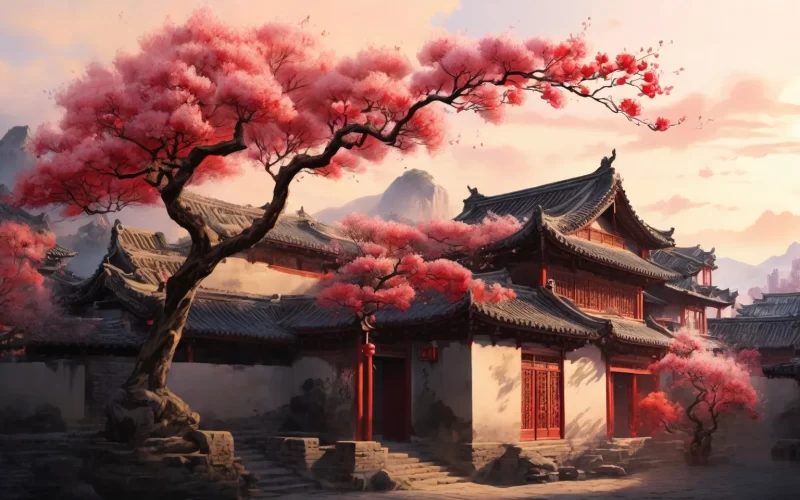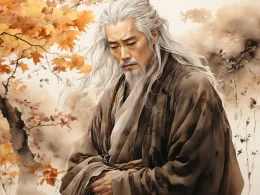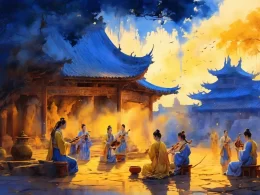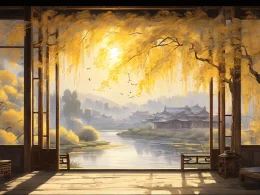When those red berries come in springtime,
Flushing on your southland branches,
Take home an armful, for my sake,
As a symbol of our love.
Original Poem
「相思」
王维
红豆生南国,春来发几枝。
愿君多采撷,此物最相思。
Interpretation
Composed during Emperor Xuanzong's Tianbao era (742-756) on the eve of the An Lushan Rebellion, this poem was written while Wang Wei held official position in the capital. Despite professional success, he harbored solitude—his friends like Pei Di having retreated to mountain reclusion. Drawn to Chan Buddhism and nature, Wang Wei channeled these complex emotions into four deceptively simple lines. Using red beans (相思子, "love peas") as emotional vessels, the poem transcends specific dedication, serving equally as friendship token or romantic yearning, becoming an enduring masterpiece of symbolic expression.
First Couplet: "红豆生南国,春来发几枝。"
Hóngdòu shēng nánguó, chūnlái fā jǐ zhī.
Red beans grow in southern lands; Spring coaxing forth how many sprigs?
The opening employs nature as emotional catalyst. Red beans (traditionally exchanged as love tokens) situate the poem geographically ("southern lands" hinting at the recipient's abode) while the spring-growth question transforms botanical observation into tender inquiry—the unspoken subject being longing itself.
Second Couplet: "愿君多采撷,此物最相思。"
Yuàn jūn duō cǎixié, cǐ wù zuì xiāngsī.
Gather them plentiful, I pray—No better emblem of love's sway.
Shifting to gentle exhortation, the language turns intimate yet restrained. "I pray you gather" (愿君多采撷) masks deep vulnerability beneath surface grace, while "no better emblem" (最相思) crystallizes the poem's essence—ordinary seeds made extraordinary through emotional alchemy.
Holistic Appreciation
This exquisite poem demonstrates Wang Wei's mastery of subtle emotional expression through natural imagery. The red beans, traditionally symbolic of longing, become vessels carrying profound human connection across distances. Wang Wei's genius lies in his restrained approach - rather than directly declaring his feelings, he crafts a delicate interplay between speaker and recipient through gentle suggestion and symbolic action. The seasonal reference to spring's renewal adds layers of meaning, transforming what appears to be simple botanical observation into a meditation on enduring affection. The poem's power emerges from its quiet restraint, where every carefully chosen word resonates with unspoken depth, embodying the classical Chinese aesthetic that values implication over declaration. This short verse ultimately transcends its specific context to speak universally about the nature of true connection that flourishes through shared understanding rather than elaborate demonstration.
Artistic Merits
This poem exemplifies Wang Wei's signature style of conveying emotions through natural imagery. The language appears simple and unadorned, yet resonates with profound emotional depth. The poet masterfully employs the red bean motif - traditionally symbolic of longing - to express unspoken affection. Rather than directly stating his feelings, Wang Wei uses subtle suggestion and gentle persuasion ("may you gather them often"), creating a delicate interplay between speaker and recipient. The poem's power lies in its restraint; each carefully chosen word carries layers of meaning, from the seasonal reference to spring's renewal to the implied intimacy of sharing symbolic objects. This refined technique demonstrates Wang Wei's ability to achieve maximum emotional impact through minimal expression, embodying the classical Chinese aesthetic principle of "less is more."
Insights
The poem reveals a fundamental truth about human connection: genuine affection requires no elaborate demonstration. Through the simple act of gathering red beans, Wang Wei shows how profound emotions can be conveyed through symbolic gestures and shared understanding. The poem teaches us that real intimacy often resides in quiet moments and unspoken agreements, where the smallest tokens carry the greatest meaning. In an age of constant communication, this ancient verse reminds us that some bonds transcend words, flourishing instead through mutual recognition and patient devotion. The red beans become more than plants; they transform into vessels carrying the weight of human connection across distances, proving that true affection needs only a symbolic language understood by kindred spirits.
Poem translator
Kiang Kanghu
About the poet

Wang Wei (王维), 701 - 761 A.D., was a native of Yuncheng, Shanxi Province. Wang Wei was a poet of landscape and idylls. His poems of landscape and idylls, with far-reaching images and mysterious meanings, were widely loved by readers in later generations, but Wang Wei never really became a man of landscape and idylls.












